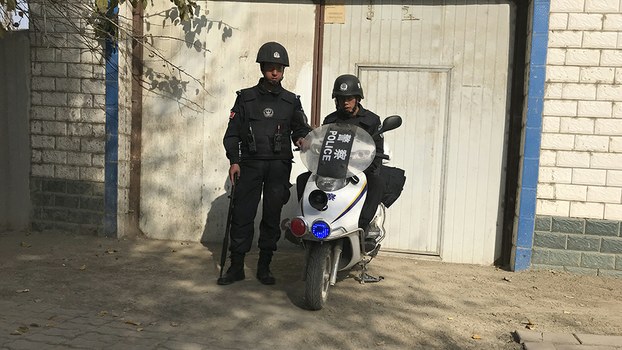A pair of Uyghur brothers who had both been held in the same internment camp in Kashgar (in Chinese, Kashi) prefecture, in northwest China’s Xinjiang Uyghur Autonomous Region (XUAR), have died in detention, according to sources.
Idris Qunduz, 53, and his younger brother, 45-year-old Hezim Qunduz, died in December 2018 and in June this year of unspecified causes, the head of their home village in Yengisheher (Shule) county’s Ermudun township recently told RFA’s Uyghur Service.
“Idris Qunduz died last year in December,” the Communist Party secretary of Ermudun’s No. 1 village said, when asked who under his jurisdiction had perished in the XUAR’s vast network of internment camps, where authorities are believed to have held more than 1.5 million Uyghurs and other Muslim minorities accused of harboring “strong religious views” and “politically incorrect” since April 2017.
“[He died] in a prison in Urumqi, but I don’t know which one,” the party secretary said, noting that he had first been held in Yengisheher county’s Chengan Camp and later transferred to the facility in the regional capital.
Idris Qunduz had a brother, “Hezim Qunduz … [who] died in [the Chengan] internment camp,” he said.
When asked what the cause of their deaths was, the party secretary said he was unsure.
“The authorities didn’t reveal the reasons of the deaths … we were simply told that they became ill and died,” he said, adding that he had visited with their families to convey the news.
Their bodies were not returned to their families, he added.
The party secretary said that Idris Qunduz was a farmer and his wife is a homemaker, but did not provide about Hezim Qunduz’s profession.
While the party secretary told RFA that there are two internment camps in Yengisheher county, he did not say why Idris Qunduz had been sent to a prison in Urumqi, or why the brothers were detained in the first place.
Details about the deaths of people detained in internment camps are typically held back, even from officials in their home villages, he said, and if the bodies of those who have died are returned to their families, relatives are warned not to divulge any information to the public.
The majority of bodies are never returned to their loved ones, he added.
Mass incarcerations
While Beijing initially denied the existence of the camps, China this year changed tack and began describing the facilities as “boarding schools” that provide vocational training for Uyghurs, discourage radicalization, and help protect the country from terrorism.
China recently organized two visits to monitor internment camps in the XUAR—one for a small group of foreign journalists, and another for diplomats from non-Western countries, including Russia, Indonesia, Kazakhstan, and Thailand—during which officials dismissed claims about mistreatment and poor conditions in the facilities as “slanderous lies.”
But reporting by RFA’s Uyghur Service and other media outlets suggest that those in the camps are detained against their will and subjected to political indoctrination, routinely face rough treatment at the hands of their overseers, and endure poor diets and unhygienic conditions in the often overcrowded facilities.
Mass incarcerations in the XUAR, as well as other policies seen to violate the rights of Uyghurs and other Muslims, have led to increasing calls by the international community to hold Beijing accountable for its actions in the region.
The U.S. Senate last week unanimously passed the first legislation by any nation in response to human rights abuses against ethnic Uyghurs in the XUAR, which would authorize regular monitoring of the situation by various government bodies.
The bipartisan Uyghur Human Rights Policy Act, introduced by Senators Marco Rubio of Florida and Bob Menendez of New Jersey, would appoint a special State Department coordinator on the XUAR and require regular reports on the region’s internment camps, surveillance network and security threats posed by an ongoing crackdown on the Uyghur people—if ratified by the House of Representatives.

